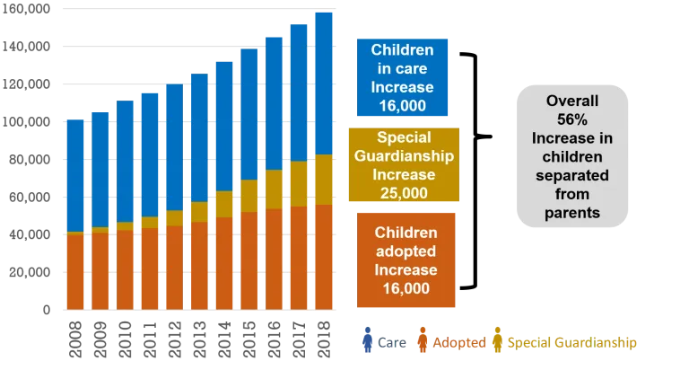Human rights implications of the government’s response to Covid-19

Image source: Bilson, A., & Munro, E. H. (2019). Adoption and child protection trends for children aged under five in England: Increasing investigations and hidden separation of children from their parents. Children and Youth Services Review, 96, 204-211.
In July 2020, the UK Parliament Joint Committee on Human Rights held an inquiry about the implications of the government’s response to Covid-19 on human rights. ATD Fourth World submitted evidence focused on the impact of poverty on the right to respect for family life. These are excerpts:
“On 24 April 2020, Statutory Instrument 1445 came into force without consultation or scrutiny. These regulations relax or remove local authority’s statutory duties to children in care and on the edge of care including safeguards around adoption and foster care proceedings and expected standard of care in children’s homes.
“The lock-down closed child contact centres, where parents had been able to visit their children who are in long-term foster care. In the absence of specific guidance, some centres proposed virtual contact visits. However, take-up has been low, due in some cases to parents in poverty lacking access to smartphones and data. Other centres propose only telephone contact, more briefly than previous in-person visits.
“For example, a couple who shares parental responsibility with foster parents used to see their three children for two hours a month in a contact centre. During lock-down, they have been allowed only one telephone call of 30 minutes, with each child able to speak for less than ten minutes. In other situations, parents have been told that their child’s young age would make virtual contact ‘meaningless’ and it has therefore not been arranged.
Remote Family Court Proceedings
“ With family court proceedings taking place remotely, there is grave doubt about how fair and empathetic such hearings can be. The technical obstacles connecting birth parents, foster carers, solicitors, social workers, and judges remotely are sometimes insurmountable for parents who cannot afford data. During remote hearings, parents cannot be in the same room as their solicitors. In close quarters and with schools closed, some children overhear everything.
“No one can verify if any party is recording has an uninvited person listening in. A parent not giving evidence becomes completely invisible to all the others. At the end of the hearing, parents who may have lost custody of their children are completely alone without anyone who can offer them empathy or moral support. In some cases, when a child is about to be forcibly adopted, the in-person ‘farewell contact’ with birth parents and siblings has been replaced with one last virtual contact.”
To read the whole submission, please click here.
Parent Advocacy
As part of the Parents, Families and Allies Network, ATD Fourth World also collaborated on this submission to the inquiry, which urges that parent advocacy be introduced to reduce the need for children to be taken into care:
“Parents are facing unprecedented communication challenges with professionals with whom they have a significant power imbalance. Parent Advocacy in which parents provide peer support is proven to help parents work more effectively and efficiently with professionals, reduces the need for children to be taken into the care system and creates better outcomes for children. In New York it has contributed to a decrease from 50,000 children in care to just 10,000.
“Independent Parent Advocacy would be hugely beneficial to parents involved in child protection including where children are currently looked after. Children need their parents and even if those parents are facing challenges that makes it difficult for their children to be in their care, the children benefit from their parents being supported to be involved and children’s rights are protected. Parent Advocacy is a long term, sustainable investment that would help parents and their children better navigate not only Covid-19, but the next crisis and the one after that.”

